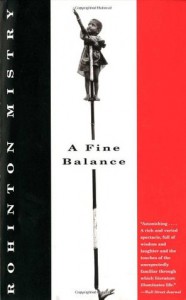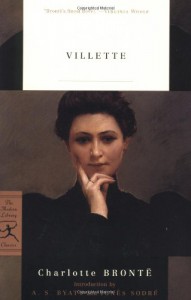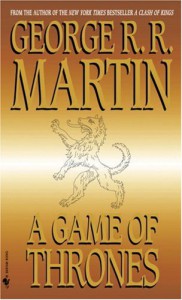Currently reading



Checkmate

A Fine Balance is a long and painful journey to India’s Emergency in 1975, declared by Prime Minister Indira Gandhi, after the High Court of Allahabad found her guilty of using illegal practices for her election campaign and unseated her from power.
The book focuses on four main characters, whose lives intersect in a period of mass sterilisation, severe censorship of the press, horrific work camps, and countless incidents of human rights violations, all in the name of the nation-wide Emergency of course, and has to be one of the most depressing and compelling books I have ever read.
Rohinton Mistry does a great job in developing lovable characters that endure indescribable terror with such strength and courage, you wish you were there for them as a friend. The plot is an epic long, detailed and full of cruelty Dickensian narrative and the climax is often too overwhelming to allow other things get in the way of just carrying on with the reading.
The prose is as simple as it gets. Is it due to the author’s writing style in general? Or are all stylistics purposely stripped from the language as unnecessary baggage to one hell of a strong story? I have no idea, but the matter of fact is that the story is that strong.
If you’re interested in an absorbing and insightful commentary on India’s politically and socially turbulent Emergency era, A Fine Balance is a must read, but prepare for misery. Which brings me to the reason why I can’t give this book five stars: Given that the characters are fictional, the unending series of tragedies that they go through and the excessive coincidences that affect them, often push them towards caricature. I mean I’m trying to empathise with the drama, I really am, but nobody suffers that much. Come on.
Still, brutally wonderful.
Reading progress update: I've read 100 out of 771 pages.

Charles Dickens, you monster!
I love the fact that Tartt hasn't even tried to deny the obvious influence (besides, what would the point be? seriously) and I dig her writing and story so far.
 8
8
"Freakonomics"?? Really? REALLY?

For a book that so heavily relies on (mostly) untested assumptions, the repeated, passionate references to the distinction between causality and correlation is impressive if not audacious, to say the least.
Suffice to say, “"As Levitt sees it, economics is a science with excellent tools for gaining answers but a serious shortage of interesting questions".
Exactly, Stephen. And that would work extremely well as an inside joke too. Unless you are implying that, in contrast with the usual textbooks, Freakonomics actually uses science to pose those questions. In which case, and given the absolute lack of evidence, statistics and insight on any methodological tools here, I can’t help wondering: Science? What science? Where? GIVE ME ONE PAGE.
The other unfortunate thing here is the “Revised and Expanded edition” issue, which can generally mean a number of things, but in the case of Freakonomics in specific, it was, as we know, the result of a huge wave of negative feedback from reviewers due to:
a) the fact that the authors massively exaggerated some of their assumptions (because, obviously: when you think you’re using science when you really are not, that’s just bound to happen) and, as if this isn't enough already, the authors’ reliance on some quite noticeable mathematical monstrosities.
b) The self-praise:
“Hi. I’m Stephen J. Dubner. And I’m co-authoring this book. The other author is Steven D. Levitt and he’s such a genius, radical economist that we’re thinking we’ll stuff Freakonomics with tons of newspaper clippings on how awesome he is. And that’s gonna be all over the place. Yes! Oh, in case you’re wondering what a too-cool-for-school unconventional genius like Steven D. Levitt is doing writing books instead of just being a weird recluse in permanent scientific euphoria, worry not! He wasn't interested in writing anything, silly ones (as if)! Not unless it was with me, because, in case you haven’t figured it out already, I’m a kickarse, amazing journalist too! So please read us. Please. We’ll make you feel important and scientific”.
So apparently they got the message and scrapped most of that out of the book, hence the “Revised and Expanded” edition.
But honestly, when I found all that out, for a moment I thought I needed to double check that I was actually reading the revised thing.
I was? Really? REALLY? WHAT WAS THE FIRST VERSION LIKE THEN?
And it’s certainly not my fault that Nick Hornby has the answer to nearly everything. I don’t remember which issue of The Believer he wrote that in, but it was along the lines of: "Freakonomics was a cool book and it made me feel smart. But what was it about?”
Exactly, thank you.
Two stars, because some of the questions they pose have interesting political and social implications, even though all questions are always posed through prose (with the use of loose logic at best) and absolutely not through the use of science.
Oh. And the title is.. er.. misleading (Today I’m nice).
8 Great Books About Record Labels for Music Nerds
Right then. More book hunting downtown for me following the Easter hols!
(Although, why isn't The Creation Records Story: My Magpie Eyes Are Hungry for the Prize on this list?
http://flavorwire.com/425314/7-great-books-about-records-labels-for-music-nerds/view-all/
 7
7
Faraway, So Close!

“And when the universe has finished exploding, all the stars will slow down, like a ball that has been thrown into the air, and they will come to a halt and they will all begin to fall toward the center of the universe again. And then there will be nothing to stop us from seeing all the stars in the world because they will all be moving toward us, gradually faster and faster, and we will know that the world is going to end soon because when we look up into the sky at night there will be no darkness, just the blazing light of billions and billions of stars, all falling.”
That good.
Christopher is 15 years old and under the autism spectrum. He is emotionally detached and exceptionally logical. And he’s trying to solve the mystery of Wellington’s killing. Wellington is the neighbour's dog. Christopher is also the narrator of The Curious Incident Of The Dog In The Night-Time, and because Mark Haddon did such a bloody good job in this book, all of his peculiarities, the naivety of his youth, the precise and analytical way he sees life, his unusual mathematical skills, as well as his awkwardness around other people come through with every word.
And not only that; Mark Haddon’s greatness here is such, that he manages to infuse this unique novel with humour, sensitivity and immense emotion, all still conveyed by an emotionally alienated boy!
Christopher is weird, but charming-weird. He knows “all the countries of the world and their capital cities and every prime number up to 7,507” and he is by far the most memorable and engaging narrator I've come across since I don’t know when that I can empathise with.
And through Mark Haddon (whose other books I now equally want to read like crazy obviously), Christopher’s perception and depiction of the world is phenomenal.
And eventually there is no one left in the world except people who don't look at other people's faces and who don't know what these pictures mean 
and these people are all special people like me.
 3
3
A screaming comes across the sky.

This is not a pleasurable read.
This is not an unpleasurable read.
This is a mind-dissolving read.
The absurd coincidence of the Germans’ V-2 rocket bombings locations during World War II and Tyrone Slothrop’s mapping of sexual scores is merely the tip of the iceberg of the monumental illogicality that is this book, among a gazillion other things.
This monster novel is as unreasonable and stylistically elaborate as it is intelligent and, interestingly enough, carefully structured, and Thomas Pynchon is THE guide to that terrifying writers’ world where the line between reality and fantasy is a blur.
Gravity’s Rainbow is an overwhelming achievement of conceptual fiction full of researched symbolism and metaphor, full of global historical, cultural, literary, philosophical and behavioural references and full of linguistic risks (that pay off).
Yes, of course abstract postmodernism is the known excuse of the elitist (see “I’ll write something incomprehensible and nobody will dare to say it’s rubbish; not if I call it avant-garde” mentality), but that shouldn't drag the real thing down.
For me, Gravity’s Rainbow doesn't actually score a Ulysses ten-out-of-ten, because some of its references and themed concepts felt better approached than others; noticeably better. Corporate conspiracy, the penile nature of rocket science and Pynchon’s existentialist explorations were fantastic, but I’m not sold on those make-love-not-war passages, because I didn't believe them.
On the other hand, Gravity’s Rainbow is so effortless, it makes a good book like Infinite Jest look accessible and desperate for polarity. As talented as David Foster Wallace was (a lot), Infinite Jest reeks of a “love me or hate me, but please don’t just like me” attitude, which actually helped me decide upon the 3 stars that I rated it with. Infinite Jest is a good book, but it isn't the real thing because the author’s talent is at odds with the book’s pretentious atmosphere. And this is why I only liked it. With Gravity’s Rainbow none of that feels significant, because it is the real thing.
Definitely not for the impatient, but isn't this at the core of making sense out of reading anyway?
Now everybody— 
Reading progress update: I've read 64 out of 352 pages.

Right at that moment, I would have liked to text Stuart, but I didn’t have his mobile number any more. I would have liked to text him to say that I understood, now, what it was that he’d been trying to tell me about cars. Cars are like people. We mill around every day, we rush here and there, we come within inches of touching each other but very little real contact goes on. All those near misses. All those might-have-beens. It’s frightening, when you think about it. Probably best not to think about it at all.
 2
2
 5
5
Reading progress update: I've read 93 out of 573 pages.

Τhe negation of severe suffering was the nearest approach to happiness I expected to know. Besides, I seemed to hold two lives - the life of thought, and that of reality; and, provided the former was nourished with a sufficiency of the strange necromantic joys of fancy, the privileges of the latter might remain limited to daily bread, hourly work, and a roof of shelter.
The reader already likes you Lucy Snowe!
 7
7
STOP THE PRESS: Troll on a killing spree writes wonders.

That the world of A Game Of Thrones is a brilliant epic fantasy is something I more or less expected. But the really genius part about it, the fact that it so strongly deviates from typical fantasy at the same time, was completely unknown to me, otherwise I would have read this book way earlier.
The Known World of A Song Of Ice And Fire is not only believable and realistic, but also shockingly reminiscent of our own world, in terms of structure, morale and cultural diversity, with an incredible attention to detail and background. The characters are real and unusual, strange and at times unpredictable, flawed and most importantly, morally ambiguous (just like us!) The depth of character development, especially considering that there’s so many protagonists to portray here, is simply phenomenal and without the slightest impact on the pacing and excellent fluidity of the book. I dare anyone to point me to one page that they think boring.
And that’s the short answer to the "but why over 800 pages?" question.
With the exception of the obvious one or two genuine bastard bastards, no one in this novel is positively good or evil, and it’s precisely this aspect that makes the people of The Known World feel insecure. Yes they fear their gods, the dragons and what’s beyond the Wall. But their biggest worry is greed and lust for control and power as an inherent trait of humanity. At the end of the day, whom can you trust if anyone? And this sense of fear of the dark side of man is brilliantly infused throughout the book.
A Game Of Thrones is also a story of violence, homosexuality, rape and death and George R.R. Martin evidently doesn't care about literary clichés, established faux-pas and deus ex machinas that will offer the expected happy ending to the cliffhanger with a cherry on top. And he gets away with it too, because he’s so bloody good.
There’s nothing (literally nothing) cookie cutter about A Game Of Thrones. If you want Gandalf the Grey to come back as Gandalf the White while you enjoy your popcorn, nothing beats J. R. R. Tolkien and you should be aware that aesthetically and morally speaking, the A Song Of Ice And Fire series is a different concept altogether. So expect ugliness. And expect a beautifully devised and incredibly well written unconventional fantasy story. Flawless*.
*almost actually. A couple of times sex felt just shoved in willy-nilly, but that is really very very minor.
 3
3
I write like ....
I understand that originally this comes from As the Curmudgeon Grumbles and many thanks to BrokenTune - Reviews & Rants for reblogging it too.
I feared for the worst, but eventually posted a review I just finished am just finishing writing (typical) of A Game Of Thrones and got H.P. bloody Lovecraft. (so maybe this isn't that reliable after all, ha!).
Off to dig out more stuff I'm writing. Love it!
 4
4
Reading progress update: I've read 39 out of 143 pages.

Re-read because the first time with this book doesn't count.
Beyond soul searching, beyond rating systems.
Soul exercises to be carried out S L O W L Y.
(No idea how good the translated version is though. Sorry)
 1
1






 3
3













